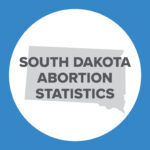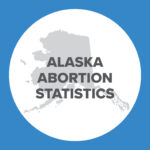Abortion Reporting: South Carolina (2021)
South Carolina’s 2021 abortion report was published in June 2022. The report revealed that abortion increased in 2021 from 2020.
Statistics and Changes in South Carolina Abortions, 2020-2021

The report does not include information on Planned Parenthood’s South Carolina abortion market share.
Abortion Totals and Trends
In 2021, there were 6,279 abortions reported in South Carolina, up 15 percent from the previous year (Fig. 1). Chemical abortions increased by 25 percent from 3,688 in 2020 to 4,623 in 2021. Chemical abortions made up 74% of abortions reported in the state. The Charlotte Lozier Institute estimates that South Carolina’s abortion rate was 6.3 abortions per 1,000 women of childbearing age, an increase of 13 percent from the previous year (Fig. 2). As of December 2022, 26 states have released 2021 abortion statistics, of which 18 showed that abortions had increased from 2020.
State Report Summary
Abortions Occurring in South Carolina
Over half (58 percent) of the abortions reported in South Carolina in 2021 were performed on women in their twenties, with 29 percent each on women ages 20 to 24 and 25 to 29. Twenty percent of the abortions were obtained by women ages 30 to 34, while 12 percent were on women ages 35 and older. Nine percent of the abortions were performed on girls ages 19 or younger with 65 abortions on girls ages 15-16 and 19 on girls ages 15 and younger.
A little less than three-quarters of South Carolina abortions (74 percent) were chemical. Sixteen percent were electrical vacuum aspiration procedures, and eight percent were performed using the dilation and curettage procedure. One percent of abortions were performed using manual vacuum aspiration and another one percent were performed using the brutal dilation and evacuation technique.
Forty-eight percent of the abortions in South Carolina were performed at six weeks post-fertilization or earlier, and 51 percent were performed between seven and 13 weeks. Less than one percent of South Carolina abortions were reported after 13 weeks post-fertilization. There were 38 abortions (0.6 percent) between 14 and 19 weeks, and 11 abortions (.01 percent) between 20- and 23-weeks post-fertilization. No abortions occurred in South Carolina in 2021 after 24 weeks post-fertilization. Post-fertilization age measures pregnancy from the date of conception, and is typically two weeks less than gestational age, which measures pregnancy from the first day of the last menstrual period.
South Carolina limits abortion to 20 weeks post-fertilization unless the baby has an abnormality that he or she is unlikely to survive, or if the mother’s life or a major bodily function is at risk. If an abortion at 20 weeks is performed, the doctor has to use the type of abortion procedure that would give the unborn baby the best chance of survival, unless doing so would put the mother’s life or major bodily function at increased risk. Unless there is a medical emergency or the unborn baby has an abnormality, the post-fertilization age must be determined before every abortion.
Ultrasound was used to determine post-fertilization age in advance of almost all South Carolina abortions (99.8 percent). Ultrasound was not used to determine post-fertilization age in six cases. For one abortion, it was not reported whether ultrasound was used to decide post-fertilization age.
There were eleven abortions performed after 20 weeks post-fertilization. Two were performed due to a medical emergency, and nine were performed because the unborn babies had anomalies. For nine of the abortions, the procedure that would give the unborn baby the best chance of survival was used; a different procedure was used for two abortions.
For four abortions, an intra-fetal injection was used to kill the unborn baby. The report does not indicate the gestational ages of the four abortions that used an intra-fetal injection.
The Post-Dobbs Era in South Carolina
After the historic overturning of the Roe v. Wade decision on June 24, 2022, South Carolina’s Heartbeat law went into effect later that month after a federal judge lifted the injunction on its enforcement. The law is still being challenged at the state level. The law restricts abortions after the fetal heartbeat is detected, which usually occurs at six weeks of gestation (around four weeks post-fertilization). The law requires abortionists to perform ultrasounds to check for a fetal heartbeat. However, in August 2022, the South Carolina Supreme Court blocked the law from enforcement as it decides whether the law is constitutional.
In August 2022, the South Carolina House of Representatives passed a bill to limit almost all abortions except in cases where the mother’s life was in danger or when the pregnancy was a result of sexual assault and had not yet reached 12 weeks of gestation. The bill failed to pass the Republican-controlled Senate and was amended and sent back to the House as new version of the state’s heartbeat law that would implement new exceptions. The bill that is now back in the House and being debated would limit all abortions after a detected fetal heartbeat (around six weeks gestation). It would only allow abortionists to perform an abortion after a detected fetal heartbeat if the pregnant woman’s life was at risk, if there were a substantial risk to a major bodily function, or if the pregnancy is due to rape or incest. However, unlike the 2021 version of the heartbeat law, the exceptions are limited to 12 weeks, not 20 weeks.
State Ranking
In 2016, CLI reviewed abortion reporting across 50 states, New York City and the District of Columbia, and South Carolina was ranked 28th best. To strengthen their reporting, South Carolina could report the race, level of education, and marital status of all women getting abortions in the state, not just residents. Furthermore, the demographic data that published online database with information on abortions performed on South Carolina residents in South Carolina, North Carolina, and Georgia, could be included in the state’s abortion reports to avoid the typical year-long delay after the publication of the state’s annual abortion report. South Carolina could also collect and report information on complications resulting from abortion.


- Abortion totals prior to 2017 are from the CDC. South Carolina did not report its chemical abortion total to the CDC in 2005.
- Rates were calculated by CLI using the following formula: (total number of abortions performed in South Carolina ÷ number of resident women ages 15-44) x 1,000. Rates may differ slightly from previous CLI articles due to revised population estimates. Population estimates were obtained from the CDC WONDER database. Estimates for 2005-2009 are intercensal estimates of the July 1 resident population. Estimates for 2010-2019 are Vintage 2020 postcensal estimates of the July 1 resident population. Estimates for 2020-2021 are Vintage 2021 postcensal estimates of the July 1 resident population. Estimates were produced by the U.S. Census Bureau and the National Center for Health Statistics.

























